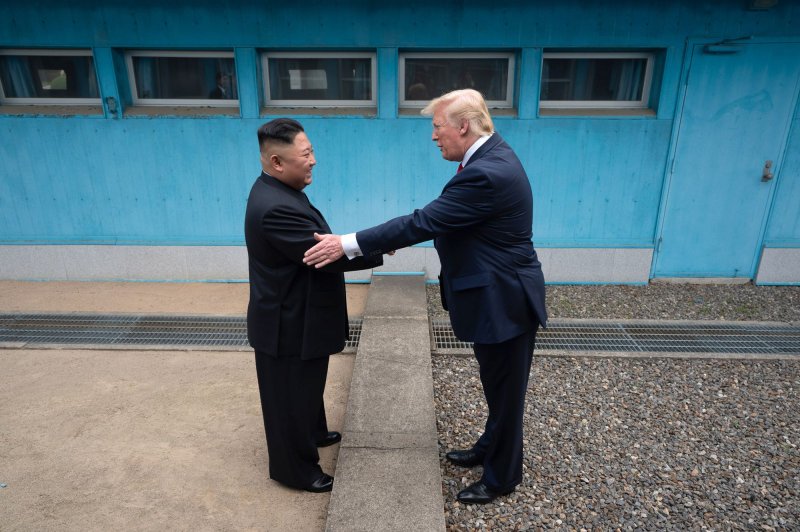President Donald J. Trump shakes hands with Chairman of the Workers’ Party of Korea Kim Jong Un on June 30, 2019, as the two leaders meet at the Korean Demilitarized Zone. White House Photo by Shealah Craighead/UPI |
License Photo
SEOUL, Aug. 8 (UPI) -- The flurry of diplomacy between the United States and North Korea that started last year brought about an easing of tensions on the Korean Peninsula but did little to denuclearize the North, a U.S. congressional report has said.
U.S. President Donald Trump's top-down approach toward Pyongyang, rooted in his belief that such a strategy would produce better results than working-level talks, has led to a series of unprecedented meetings with the North's leader, Kim Jong Un, according to a report by the Congressional Research Service published on Monday.
"These diplomatic efforts have produced a marked reduction in tensions on the Korean Peninsula, and Trump and Kim appear to have developed a personal relationship that Trump says ultimately could produce a breakthrough," it said.
Trump and Kim held their first summit in June last year and have since met twice more.
At the first summit in Singapore, the two sides agreed to forge new relations and commit to the North's full denuclearization. But their subsequent Hanoi summit in February ended without a deal due to differences over the scope and sequencing of dismantling nuclear and weapons programs by Pyongyang and Washington's sanctions relief in return.
They met again on June 30 at the inter-Korean border and agreed to resume working-level talks. But the negotiations have not resumed yet.
The report said that little progress has been made in denuclearization because Pyongyang has remained "conditional and vague" about how it will go about keeping its pledges. It also cited the North's multiple missile tests since May as another factor adding to the challenge.
"North Korea ... appears to be advancing its military capabilities ... has conducted multiple short-range ballistic missile tests, which violate United Nations prohibitions," the report states.
The prolonged impasse in North Korea diplomacy leaves Washington with the question of whether to stick to its pursuit of a gradual lifting of sanctions in exchange for incremental dismantlement, or to shift to a "big deal" by which it gives full sanctions relief in return for the North's complete surrender of nuclear weapons, the report said.
But the latter option could "reduce the number of tools available to challenge North Korea on other issues, including human rights, money laundering and its cyberspace activities," it added.















